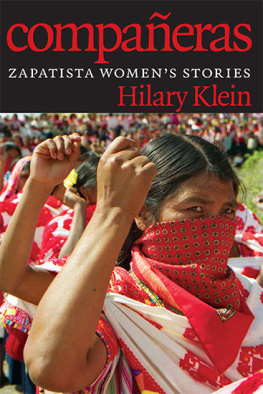
Foreword
Roxanne Dunbar-Ortiz
Hilary Kleins Compaeras: Zapatista Womens Stories is an essential addition to the extensive literature about the EZLNs autonomous communities in Chiapas, Mexico. Although it is well known that the Zapatistas have advocated for equality and leadership roles for women and girlsstarting long before the uprising on New Years Day 1994 and continuing through the presentlittle has been written about the specifics of their practices and resulting social relations, and, signifi-cantly, what lessons are to be had here for other social movements.
There is no better person to do this work than Klein, who lived in Chiapas for several years, working with womens cooperatives in Zapatista communities. Her previous experience as a community organizer in the United Statestackling issues such as affordable housing, immigrants rights, and violence against womenprepared her to be a keen observer and trusted participant in the Zapatista communities.
Compaeras is not only the story of these women but also the story of the Zapatista movement itselffrom its inception in 1983told from the perspective of women. Women and girls experienced dramatic changes in their lives, and transformed the movement into something profoundly distinct from previous social movements of the post-feminist era. Klein describes how the EZLN actively opened new spaces for womens participation and how this, in turn, radically impacted the structure, content, and aspirations of their movement. She captures the dynamic relationship between the early leadership of the EZLN pushing from above and women at the grassroots level pushing from below. And Klein makes it clear that the Zapatistas themselves still consider their movement a work in progress, acknowledging the unfinished business ofentrenched male chauvinism and traditional limitations on womens social and political lives.
Thanks to more than forty years of womens studies that emerged from the womens liberation movement, we are more aware than ever that women have always played key, decisive roles in social move- mentstheir contributions being timeless and universal. However, in our histories of social movements in the United States, we have often featured individual women, placing less emphasis on the resilience and effectiveness of movements and organizations that women have transformed through their demands for new kinds of actions and rela-tions. The powerful Student Non-Violent Coordinating Committee (SNCC) of the early 1960s civil rights movement comes to mind as an example. Kleins work presents an analytical model for reappraising movements through the lens oftheir female participants.
Compaeras, then, is brilliant and informative for its history of the Zapatista struggle, but is also relevant and useful in developing current movements and organizations everywhere, perhaps especially in the United States. Compaeras suggests an array of potential lessons for those of us who are fighting for social justice in this country and beyond. This book is a timely invitation to readers to reflect on those lessons for themselves.
ROXANNE DUNBAR-ORTIZ is one of the founders of the womens liberation movement of the late 1960s. She has been involved in union organizing, in movements against the Vietnam War and imperialism, and since 1973 has worked with indigenous communities for sovereignty and land rights. A historian, writer, and professor emeritus in Native American Studies at California State University, she is author of Roots of Resistance: A History of Land Tenure in New Mexico and The Great Sioux Nation, as well as a memoir trilogy: Red Dirt: Growing Up Okie; Outlaw Woman: A Memoir of the War Years, 19601975; and Blood on the Border: A Memoir of the Contra War. Her book An Indigenous Peoples History of the United States was released in September 2014.

Zapatista women from the village of Amador Hernandez prepare to stand off with Mexican soldiers. (Photograph by Tim Russo.)
This is a book that should be on every activists reading list, and in every social studies class.
RAJ PATEL, author of The Value of Nothing and Stuffed and Starved
Compaeras provides a view from within the Zapatista communities of the women who are making history in the Lacandon settlements.... Working in producer and market operations, the women gained the ability to voice their history in moving accounts that reveal what led to the revolt and the changes they have succeeded in making during the twenty years since the uprising.
JUNE NASH, Distinguished Professor of Anthropology Emerita, The City University of New York
Hilary Klein has given us a rare gift: an accessible book that beautifully conveys the experience of many indigenous Zapatista women in a time of incredible social mobilization and change.
SHANNON SPEED, Director of Native American & Indigenous Studies at the University of Texas at Austin and editor of Dissident Women: Gender and Cultural Politics in Chiapas
The Zapatista movement captures the essence thatas we build collective power to achieve social justice, we make the road by walking. Compaeras contains many valuable lessons for those of us in the immigrants rights movement in this country, and is a must-read for all organizers and movement-builders.
JAVIER H. VALDS, Co-Executive Director of Make the Road New York
Women are taking leadership in social change. Again. In this very special book, Hilary Klein describes how women do this within the Zapatista movement and explains why Zapatista women can firmly say, Today there is hope and freedom in our lives. Not only is this a fascinating book, it should be a solid point of reference for all those interested in constructing a new world of freedom.
GUSTAVO ESTEVA FIGUEROA, author of Celebration of Zapatismo
Klein has made a tremendous contribution to the world.... Compaeras would be a delight to use in college courses in Womens Studies, Latin American Studies, Sociology, or Political Science.
KAREN KAMPWIRTH , Robert W. Murphy Professor of Political Science at Knox College and author of Feminism and the Legacy of Revolution: Nicaragua, El Salvador, Chiapas
This is a book for women and men, for activists and for students, for survivors and world-changers, for the oppressed, the poor, and the precarious. Onwards compaeras y compaeros!
PETER LINEBAUGH, author of Stop, Thief!
The Commons, Enclosure, and Resistance
This account of resistance is a unique document that will enable the reader to understand the profound implications of the Zapatista uprising for indigenous women. Hilary Klein brings to the Englishspeaking world the soulful stories of indigenous women who have decided to build a world in which many worlds fit.
R. ADA HERNNDEZ-CASTILLO, author of Histories and Storiesfrom Chiapas Border Identities in Southern Mexico and editor of Dissident Women: Gender and Cultural Politics in Chiapas
Hilary Klein has provided us with the most beautiful gift.... I was beyond moved by this book. I love it. It is a tool for constructing freedom, by women, in the creation of new worlds.
MARINA SITRIN, author of Everyday Revolutions: Horizontalism and Autonomy in Argentina and co-author of They Cant Represent Us!: Reinventing Democracy from Greece to Occupy
As refreshing as cool water in a heat wave.... A richly textured narrative where political and historical context blend seamlessly with the compellingly personal.
Next page















